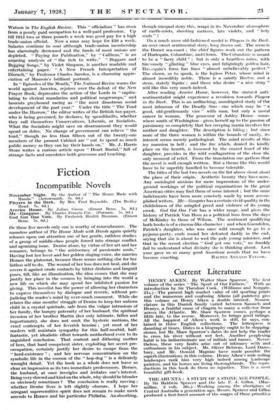Fiction
Incompatible Novels
November Night. By the Author of " The House Made with Hands." (Arrowsmith. 7s. 6d.)
Benn. 7s. 6d.)
OF these five novels only one is worthy of remembrance. The nameless author of The House Made with Hands again quietly releases upon our attention one of her gentle, ruthless studies of a group of middle-class people forced into strange conflict and agonizing issue. Denise alone, by virtue of her art and her romance, belongs to " the aristocracy of passionate souls." Having lost her lover and her golden singing-voice, she marries Horace the plutocrat, because there seems nothing else for her listless self to do. The wound of her loss does not heal, and she covers it against crude contacts by bitter disdains and languid poses, till, like an illumination, the idea comes that she may justify her place in the cosmos by bringing into the world a new life on which she may spend her inhibited passion for giving. This novelist has the power of allowing her characters to express themselves by dialogue and reverie, without pre- judicing the reader's mind by over-much comment. While she relates the nine months' struggle of Denise to keep her unborn child in a crystal quietude, safe from the vulgar intrusions of her family, the hungry paternity of her husband, the spiritual invasion of her. brother Martin (her only intimate, fallen and importunate), she does not omit the hysteric motions, the cruel contempts of her feverish heroine ; yet most of her readers will maintain sympathy for this half-morbid, half- fantastic, yet idealistic effort towards motherhood even to its anguished conclusion. That content and dithering mother of hers, that hard competent sister, exploiting her secret pre- occupation, certainly justify her desire to escape from the "herd-existence " ; and her nervous concentration on the symbolic life in the cocoon of the " hop-dog " is a delicately wrought detail: Yet the book as a whole does not leave so clear an impression as its two immediate predecessors. Horace, the husband, at once inveigles and irritates one's interest. Being very shrewd and kind on the whole, why should he blunder so obviously sometimes ? The conclusion is really moving ; whether Denise lives is left slightly obscure. I hope her arrogant supersensitive spirit does not remain to make meek amends to Horace and his particular Philistia. An absorbing,
though unequal story this, wrapt in its November atmosphere Of earth-mists, shooting meteors, late violets, and " holy Souls " 1 • - • •
On a much more old4ashiOned model is Players in the Dark, an over-sweet sentimental story, long drawn out. The scene is the Dorset sea-coast ; the chief figures work out the pattern of Harlequin, Columbine, and Clown. The Columbine is meant to be a " faery child " ; but is only a heartless minx, with tiresomely " glinting " blue eyes, and fatiguingly golden hair.. Hai:eqpin's form has lines ".almost unbelievably perfect." The clown, so to speak, is the legless Peter, whose mind is almost incredibly noble. There is a saintly Rector, and a• stern, stately Squire ; and those who desire a nice story " will like this very much indeed.
After reading Avarice House, however, the sternest anti. sentimentalist might experience a revulsion towards Players. in the Dark. This is an unflinching, unmitigated study of the most inhuman of the Deadly Sins—one which may be "a' good, old-gentlemanly vice " with man, but only a moral cancer in woman. The possessor of Ashley House—some- where south of Washington—gives herself up to the passion of parsimony so completely that her creeping mania involves her mother and daughter. The description is biting ; but since none of the three women is within the bounds of sanity, its interest seems merely pathological. The mind revolts at this icy mansion in hell ; and the fire which, denied its kindly place on the hearth, is loosened by the crazed hand of the daughter, provides in the wild conflagration of the close the only moment of relief. Froria the translation one gathers that the novel is well enough written. But a theme like this would have to be superbly handled to become tolerable.
The titles of the last two novels on the list abOve shout aloud the place of their origin: Aesthetic beauty they have none. Any 'sociologist anxious for more impressions of the under- ground workings of the political organizations in the great American cities may find them of some interest ; but the sane indiaments have been more concisely made by more accom- plished writers. Me—Gangster has a certain vivid quality in the childishness of the mingled greed and violence of its young crook. God Got One Vote has a wider range, and gives the history of Patrick Van Hoos as a political boss from the days of McKinley to those of Wilson. The sentiment qualifying both books is of a cinema-like character ; and when Guendolen, Patrick's daughter, who was once wild enough to go to a pyjama-party, curls round her defeated daddy in the end, saying that she is about to wed the pale young minister, and that in the recent election " God got one vote," we frankly fail to understand what divinity she is thinking about. Last year gave us so many good American novels that we have






































 Previous page
Previous page